An estimated 160 million children are engaged in child labour worldwide, the equivalent of 10% of the global child population1. Of these, 70% are working in agriculture with a link to the fashion sector using goods to be exported to Europe. A recent EU-funded project has raised awareness among European consumers and engaged with policymakers and companies to improve the livelihoods of the smallholder farmers and workers behind these products.
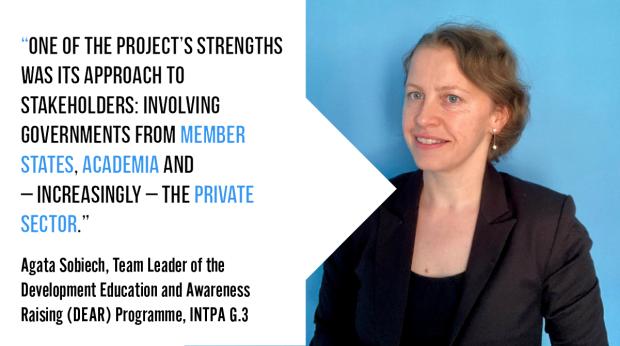
Many child labourers are essential workers in supply chains for food and products used in the fashion industry bound for Europe2. Child labour and forced labour, gender inequality, discrimination, poor working conditions and renumeration and other poverty-related challenges remain a reality behind the many products imported into the EU, and consumed by Europeans on a daily basis3.
The pan-European project Trade Fair Live Fair4, funded under the EU Development Education and Awareness Raising (DEAR) Programme, achieved key transformative change targeting policymakers, European citizens, and the private sector5. The aim of the project – led by Fairtrade International together with over 20 consortium partner members of the fair trade and sustainable fashion movement – was to find solutions to the endemic poverty facing many producers and workers in developing countries, caused by power imbalance in supply chains.
Best practices of the Trade Fair Live Fair project:
1. Influencing EU policy from local to global
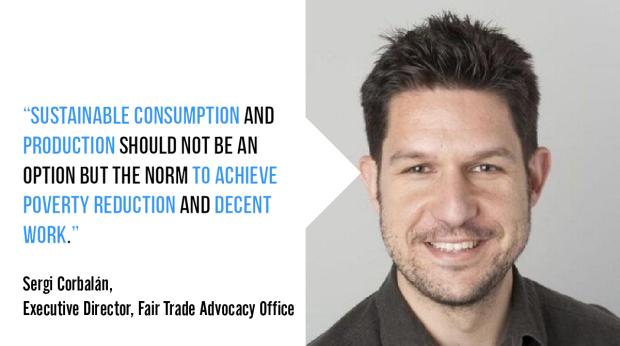
The Fair Trade Advocacy Office (FTAO) was the partner organisation leading the public policy advocacy work with local, national and European authorities. “The logic of this project was to scale up from local support of cities and communities to fair trade and ethical fashion, and bring it to the European level,” explains Sergi Corbalán, Executive Director, Fair Trade Advocacy Office.
While working on public policy advocacy, the Trade Fair Live Fair project showed that partnerships were essential in reaching over 4,000 policymakers and civil society organisations (CSO). Sergi Corbalán explains “hard work and compromise are crucial in order to change EU public policy results.” He continues, “It is often imperative to find the balance between growth and sustainability.” This can be best achieved once the priorities of workers, who are on the bottom of the supply chain, are better reflected in the commitments and policy changes of national governments.
The Trade Fair Live Fair project also contributed to ensuring that the Unfair Trading Practices Directive, adopted by the EU, also protects producers and workers in the south, as non-EU suppliers.
Trade Fair Live Fair also enabled cocoa producers from Western African countries to inform the EU multistakeholder cocoa dialogue led by the European Commission. Under this umbrella, the project’s outputs – led by Fairtrade Foundation – highlighted the need for EU companies to pay better prices for cocoa beans, in order for local farmers to achieve a living income and ensure the well-being of children. Policy reports produced during this project enabled Fairtrade to lead effective advocacy on living incomes over the past few years, whilst public campaigning efforts, such as the Fairtrade Fortnight festival in the UK, have helped build public support and political will for action.
Textile is the other big pillar in which the Trade Fair Live Fair project has been instrumental. This project – with a coalition of 53 European CSOs – asked the European Commission to put in place an EU-textile strategy, which ensures textile supply chains respect human rights while also promoting the circularity of the supply chains.
2. Evidence-based research informing private sector action
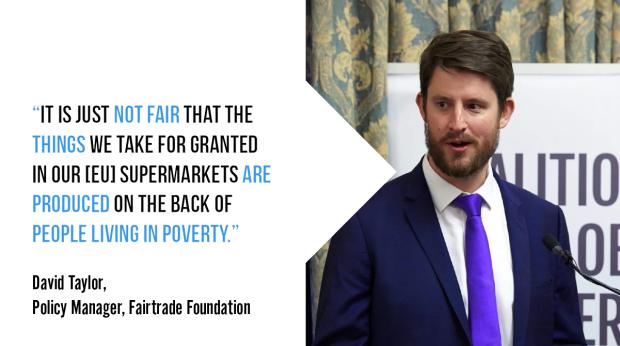
Traidcraft Exchange led the component of the project that interacts with the private sector. The focus of this area was to identify what kind of business models are needed to solve the current imbalances.
Traidcraft Exchange and the World Fair Trade Organisation (WFTO) published the report Creating the new economy, gathering the opinions of 323 fair trade enterprises and sharing 19 case studies providing specific insights on governance, innovation, commercial approach and inclusive business models.
A highlight of this report identified the primary challenge of adapting business models to achieve change: companies focus on extracting maximum profits for shareholders, creating inequalities and often allowing limited investment in the planet. The challenge lies in engaging companies to respect the environment, invest in areas where people are often marginalised or left out, while running a viable business.
Erinch Sahan, Chief Executive of WFTO, explains how business models can adapt for the future by “favouring and supporting supply chains”. He also recommends “to adapt purchasing policies to accommodate their distinctive characteristics and to report impact to create an expectation of their ethical practice.”
3. Mobilizing European consumers to demand change
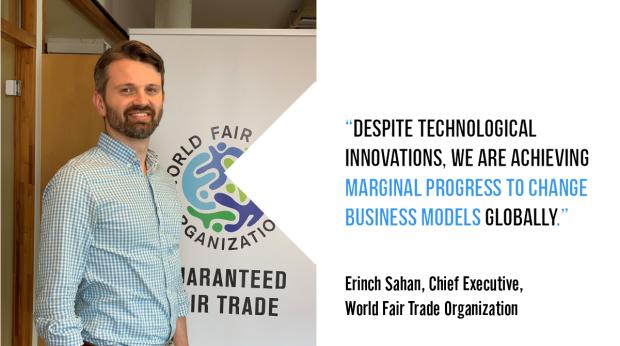
Fairtrade Foundation UK led the consortium’s research and public mobilization and awareness-raising activities. The supply chain evidence generated by the research not only informed the project’s pan-European campaigns across 20 countries (with concrete case studies, statistics and killer facts), but also helped project partners to bring concrete positions to national and local debates while demanding responses to unsustainable production realities on the ground. The project’s State of Progress report analyses the impact generated by Trade Fair Live Fair, sharing key achievements in supply chain transparency, better livelihoods for smallholders, and recommendations for advancing SDG 12 in a COVID-19 and climate crisis context. In total, the project partners engaged more than 1.2 million EU citizens on trade justice issues, reaching 50 million people indirectly.
Fashion Revolution led a public advocacy and awareness campaign and researched the reliable information available for European consumers about the working conditions in the garment industry.
This pan-European consumer survey interviewed 5,000 people aged 16-75 in the five largest European markets (Germany, UK, France, Italy and Spain). Results of this survey prove a growing appetite for young Europeans to buy clothes made without harming the environment, workers, animals, or consumers. Ranked top of the priorities mentioned, 45% of the interviewees stressed the importance to eradicate child labour.
The survey results also suggested that shoppers want more transparency from the sector; to see commitment to respecting human rights and the environment along supply chains. However, citizens feel they need support to make their demands, and encouragement to take action.
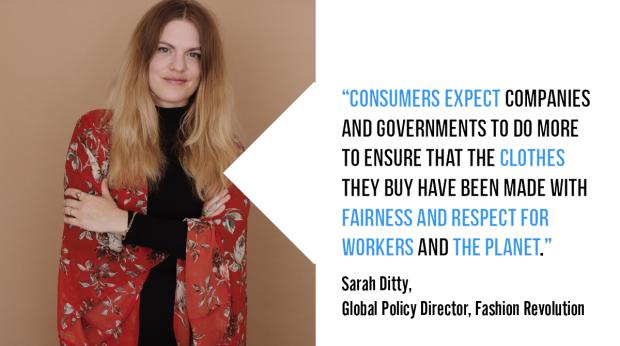
The involvement of young Europeans was done mainly on social media. Provocative, inquisitive, accessible, and inclusive messages were posted demanding greater industry transparency. Sarah Ditty, Global Policy Director of Fashion Revolution, explains, “this campaign avoided negative protesting, victimising, and naming or shaming.”
Interested and committed citizens played an active role thanks to the open-source products, in several languages and formats, to customise their demands for change. For those interested to know more, the organisation also produced educational guides, inspirational and informative videos, and tools and templates to guide them through their needs towards companies and policymakers.
The Trade Fair Live Fair project has been instrumental in understanding the different levels of awareness of public authorities depending on the Member State country, engaging with the private sector to be more in line with fair trade practices, and mobilising citizens demanding more transparency in supply chains.
Click on the play button below to watch our video about the pan-European project Trade Fair Live Fair.
Have you been working on the eradication of child labour or are you promoting fair trade practices in Europe?
What was your approach?
Did you meet any challenges and how did you address them?
Leave your comment below!
|
About Trade Fair Live Fair project Trade Fair Live Fair was implemented between 2017 and 2020 across Europe (including the UK) to foster more resilient livelihoods for the producers and workers behind many products consumed by European citizens. The project has enabled in-depth studies into the enormous challenges that prevent workers and producers in developing countries from escaping poverty. The research gathered by this project is crucial in order to raise awareness amongst European consumers, policymakers, civil society organisations (CSO) and private sector organisations, and to mobilise them to take action. To know more about the impact of this programme, watch the InfoPoint conference Food and Fashion supply chains. Best practices and recommendations towards advancing the SDGs. |
Credit: Video © Capacity4dev | Photo © Fashion Revolution
1 According to the International Labour Organisation (ILO), numbers decreased by 30% between 2000 and 2012, but COVID-19, with its economic recession and the temporary school closures, is increasing the numbers again for the first time in 20 years. For this reason, the United Nations has declared 2021 the International year to eliminate child labour. The new ILO estimates were released on 10 June 2021.
2 The EU, as the largest trading bloc, is joining the efforts made by ILO, UNICEF, and Fairtrade to eradicate this global problem by pledging zero-tolerance on child labour in EU trade policy.
3 SDG 8 (target 8.7) aims at the eradication of child labour (“Take immediate and effective measures to eradicate forced labour, end modern slavery and human trafficking and secure the prohibition and elimination of the worst forms of child labour, including recruitment and use of child soldiers, and by 2025 end child labour in all its forms”).
4 The Trade Fair Live Fair project was funded by the Development Education and Awareness Raising (DEAR) Programme (INTPA G.3) and implemented by a consortium led by Fairtrade International involving as partners the Fairtrade Foundation, Traidcraft, Commerce Equitable France, World Fair Trade Organisation, Fashion Revolution and the Fair Trade Advocacy Office.
5 The EU has recently adopted a Strategy on the rights of the child (March 2021) with a specific chapter on external action which particularly focuses on the fight against child labour. Furthermore, numerous projects have been funded by the EU such as CLEAR Cotton which aims at contributing to the elimination of child labour and forced labour in the cotton, textile and garment value chains.


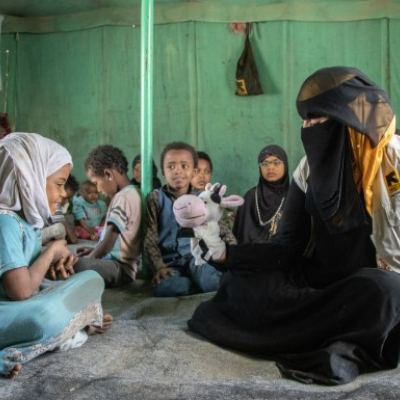
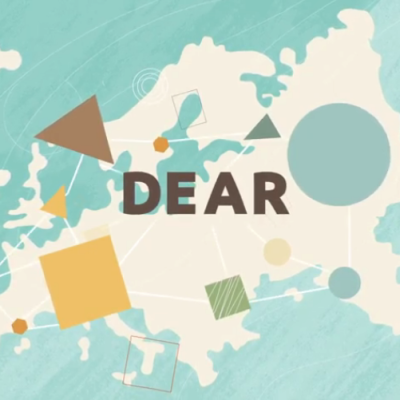

Log in with your EU Login account to post or comment on the platform.